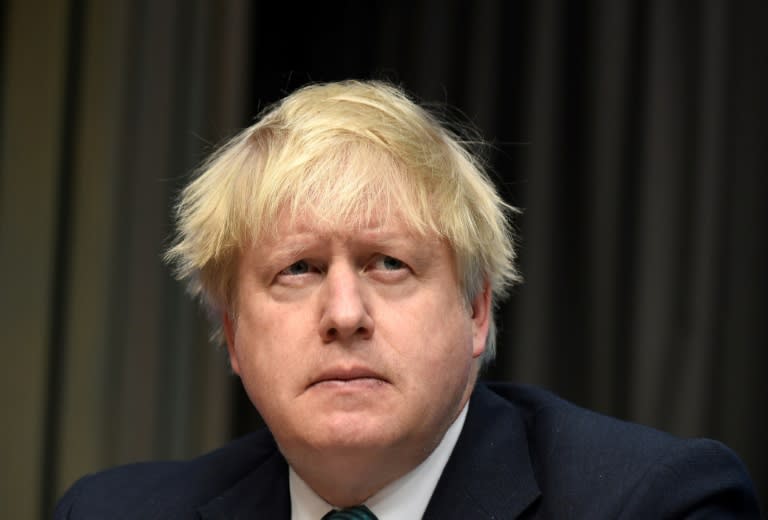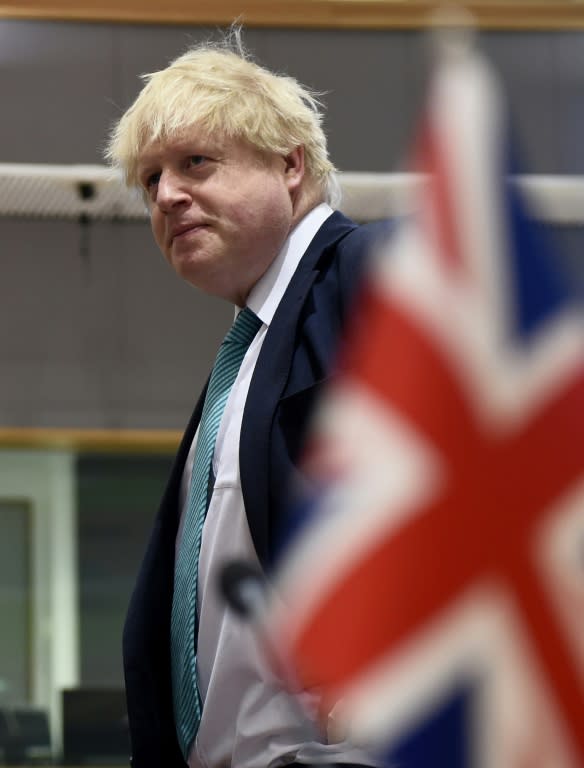Sidelined on Syria, UK's Johnson struggles for status
The rejection Tuesday of British Foreign Secretary Boris Johnson's proposal for extra sanctions on Russia and Syria is the latest setback for a former Brexit campaigner struggling for political relevance. The decision by the G7 meeting of foreign ministers in Italy came after Johnson on Saturday cancelled a scheduled trip to Russia in apparent deference to US Secretary of State Rex Tillerson's upcoming visit. "Boris out in the cold over Russia," read The Telegraph front page after the G7 rejected his sanctions proposal. British newspapers broadly took a dim view of the Conservative politician's performance on the world stage. "Johnson stung over sanctions" wrote The Times, while the Daily Mail said he had been "humiliated over Syria". They had been equally critical in their reactions to his cancellation of the Moscow trip, with The Times portraying him in a cartoon as a dog with a Union Jack collar left outside a US-Russia meeting. Russia's foreign ministry said his decision not to visit Moscow showed Britain had "no real influence on the course of international affairs, remaining 'in the shadow' of their strategic partners". - 'Lied a lot' - Johnson has long been mocked for his buffoonish antics and undiplomatic pronouncements and was always an improbable pick as foreign minister after his role in a bitterly divisive EU referendum campaign. When he was appointed in July, French Foreign Minister Jean-Marc Ayrault said Johnson had "lied a lot" in the campaign and he was booed in his first speech as foreign minister at the French embassy. At a press conference with then US Secretary of State John Kerry just a few days later he appeared to confuse Egypt with Turkey and fended off questions about his scathing past references to world leaders. As delicate Brexit negotiations loom for which Prime Minister Theresa May is keen to show goodwill towards EU partners, his gung-ho spirit appears jarring. The latest front page of Private Eye, a satirical magazine, showed Johnson wearing sunglasses on an armoured vehicle during a visit to Somalia in March. "Tally ho! Gibraltar here we come!" read the caption -- a reference to Britain's opposition to Spain having a veto over the extension of any future EU trade deal to the British territory of Gibraltar. - 'Not very successful' - On Syria, Johnson's views have proved inconsistent. In 2015, when he was still mayor of London, he argued Britain should "deal with the devil" by allying with Russian President Vladimir Putin and Syrian President Bashar al-Assad against the Islamic State jihadist group. He switched to a hawkish stance in October last year, calling on Barack Obama's outgoing US administration to impose more sanctions on Russia. But speaking to a parliamentary committee in London in January he appeared to change his tune, raising the possibility of Assad being allowed to run for re-election, saying the Western "mantra" of Assad having to leave power had not worked so far. He has now returned to the stance that Assad must go, although his most recent call for sanctions on Syrian and Russian military officials was not endorsed by May's spokesman at a press briefing Monday. A diplomatic source attending the Lucca meeting of G7 foreign ministers this week said Johnson was well prepared for bilateral talks and spoke persuasively but ultimately "appeared to have no firm ideas or beliefs and was not very successful". Johnson on Tuesday denied his failure to win agreement on sanctions amounted to a defeat, saying future penalties may still be possible if evidence is found to link individuals to the attack. "There was a very wide measure of agreement (at the G7) last night that, not just the Syrian generals, but if we could show complicity by those Russian officers who are helping the Syrian military operation, then they should also be sanctionable as well," he told the BBC. Sarah Lain, research fellow at the RUSI think-tank, said Johnson's earlier decision to skip the Russia visit was understandable as a way of showing Britain's commitment to US ties and the importance of foreign policy coordination. "Developing the relationship with the US is clearly more strategically important than direct engagement with Russia at this particular moment," she said.



